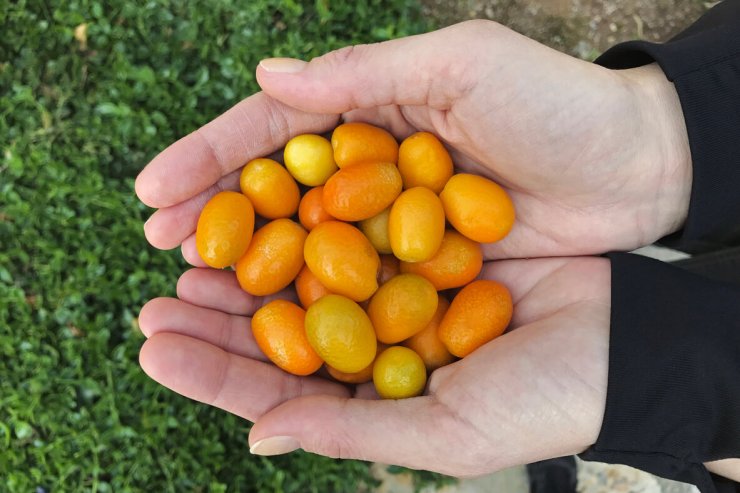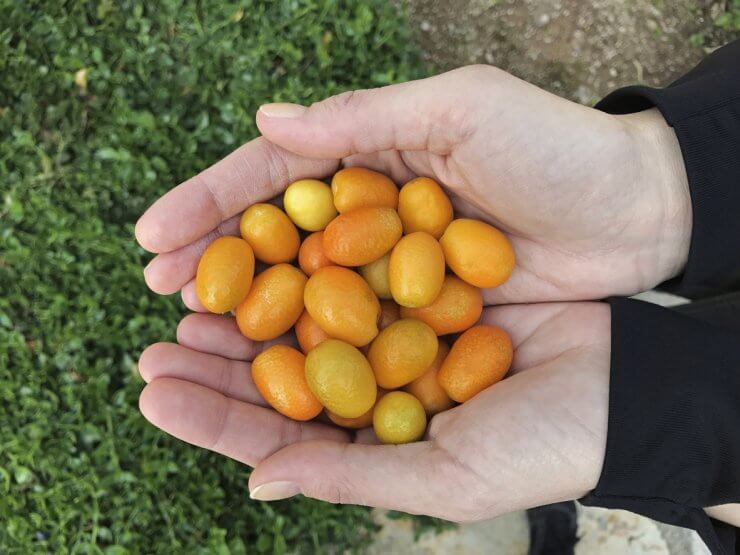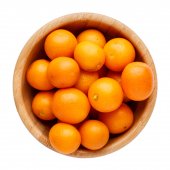
woman holding handful of kumquats

Kumquats are wonderful for your health
Kumquats are packed with beneficial plant compounds, including flavonoids, phytosterols, and essential oils. Some of the kumquat’s flavonoids have anti-inflammatory properties. The phytosterols in kumquats can help block your body’s absorption of cholesterol, which may help lower your cholesterol level.
That beautiful scent of kumquats? That’s the essential oils in the fruit. When you eat a kumquat (or two), the scent lingers on your hands and in the air. It turns out those essential oils included limonene, which is known to have antioxidant properties. When you eat a kumquat whole, that combination of flavonoids, phytosterols, and essential oils is thought to provide beneficial effects beyond what you’d get if you consumed each compound separately.
Obesity, Diabetes, & Heart Disease
Research indicates that the plant compounds in kumquats can help prevent weight gain by minimizing the growth in fats cells. Studies also show that kumquats may help play a role in regulating blood sugar levels, overall cholesterol, and LDL (bad) cholesterol.
Cancer Prevention
Some research shows that eating foods high in antioxidants could help reduce your risk of cancer because antioxidants help repair damaged DNA that’s linked to different types of cancer.
Kumquats are an excellent source of vitamin C, which supports your immune system. Test-tube studies indicate that the plant compounds in kumquats may help trigger immune cells in our bodies called natural killer cells. Natural killer cells defend the body against infection and can also destroy tumor cells.
Blood sugar control
The soluble fiber in kumquats can help lower your blood sugar and your cholesterol level. Soluble fiber dissolves in water; so this type of fiber is different than insoluble fiber that you’d consume for intestinal regularity.
Take care of that cough
In China, the kumquat has long been a source of relief for coughs and sore throats. This traditional folk remedy is easy to make and will stay fresh and ready in your fridge almost indefinitely.
Kumquats Preserved in Salt:
Print
Kumquats Preserved in Salt
Kumquats preserved in salt is a great way keep these little citrus gems edible for years. Some folks swear they become more effective as they age.
- Prep Time: 3 months
- Total Time: 3 months
- Yield: 2-4 Servings 1x
Ingredients
- Kumquats (enough to fill your jar)
- Kosher salt
- Glass jar with a tight-fitting lid
Instructions
- Wash and dry your kumquats and leave them out in the sun for a couple days to fully dry.
- Put a layer of salt in the bottom of the jar.
- Alternate layers of salt and kumquats, ending with a full layer of salt (no kumquats should be peeking through!).
- Close the lid tightly and keep the jar in a cool place for at least a few months (the fridge is fine).
- Turn the jar periodically so that the salt gets distributed evenly. You’ll notice that the kumquats release their juices over time, forming a brine with the salt.
- The kumquats will continue to dehydrate, getting smaller and darker.
Salted kumquats will keep for years. When a sore throat strikes, get out the salted kumquats and make some tea!
Kumquat Honey Tea
Print
Kumquat Honey Tea
Kumquat Honey Tea is the perfect antidote for a scratchy throat. Don’t be tempted to rinse off all the salt when making this tea because the salt helps soothe your throat too!
- Prep Time: 5 minutes
- Cook Time: 5-10 minutes
- Total Time: 10-15 minutes
- Yield: Serves 1
Ingredients
- Salted kumquats
- Hot water
- Honey
Instructions
- Put two to three salted kumquats in a mug and pour hot water over them.
- Mash the kumquats a little (or use a muddler) and let the mixture steep for a few minutes.
- Add honey to taste.
- Drink warm.
If you decide you really like the taste of kumquat honey tea, you can brew some up, chill it, and serve it over ice for a refreshing hot-weather drink.
Bottom Line
Scientists have found that eating a few kumquats a day could help you fight stress—and the more you can reduce stress, the better you’ll feel. Medical research is always exploring the benefits of what our natural world can offer us in terms of protection from and treatment of disease. It’s an added benefit to know where your food is coming from and how it was grown—and what better way to do that than to grow it right at home?
Did you know that kumquats can be so healthful? Please tell us about healthy ways you use kumquats.



